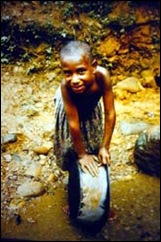What would you do right now, if you got sick? Would you get in your car and drive to your doctor? Or, would you go straight to the hospital?
What if that wasn’t an option? 
From 1997 – 1999 I was a Peace Corps volunteer in the remote Lakekamu Basin located in Papua New Guinea and that is where I came face to face with the reality that is malaria.
While serving as a volunteer I tragically witnessed many people die from various illnesses that afflict developing countries such as, diarrhea, pneumonia, and malnutrition. In fact, for most in my village, illness was just an accepted part of the daily struggle.
However, it was an incident with malaria that occurred during the final night in my village, that will stay with me for the rest of my life.
During my last night as volunteer, as my wife and I were packing our things and saying goodbye to friends, we could hear moaning and horrific screams coming from the little bush hut that acted as an aid station.
We stopped packing and went to investigate further.
Upon our arrival we witnessed a young friend of ours, the little girl above, convulsing and fighting through the final stages of cerebral malaria. There was nothing we could do to help.
I’m not sure I’ve ever felt so hopeless as we watched her pass.
That incident, and the image of her struggling and fighting dementia, has been indelibly burned into my mind.
Why did she die from cerebral malaria?
The answer: simply because the proper medication was not available in our village.
Although the village medic was trying to get her to swallow the pill form of quinine, due to her advanced state of dementia, it was impossible. And he later told me that if he had the injectable form of quinine that he could have possibly save her life.
Tragically, the death of this young woman taught me an unfortunate life lesson. Who will live and who will die, to a large extent, comes down to access:
- access to mosquito nets.
- access to anti-malarial medicine.
- access to educational materials.
Malaria & Social Media
Recently, while on Twitter, I noticed some Tweets in my stream regarding the United Nations Special Envoy for Malaria and their Social Media Envoy Group. (Read the full story here.)
The Malaria Social Media Envoy group is chartered with inspiring and activating social media audiences throughout the year in support of malaria control. The Social Media Envoys are dedicated to utilizing their social profile to keep online and offline media audiences focused on the movement, milestones and resources required to achieve the Secretary-General’s goal of providing all endemic African countries with malaria control interventions by the end of 2010.
Specifically, their hope is to have universal mosquito netting coverage by the end of 2010 and to eliminate malaria by the end of 2010.
As you might expect, the initiative has signed on some social media powerhouses (including: Jeff Pulver, Biz Stone, and Alyssa_Milano), each of whom have massive online followings and real life networks.
How I think social media help.
Absolutely no doubt, the social media players will provide a tremendous boost to this initiative. I believe in social media. My business would not have survived without it and I believe in what the people who are on the envoy are trying to do. With respect to those in the group, who I’ve been fortunate to interact with, I know they are tremendously gifted individuals.
But, I think the golden support is going to come from the little guys like you and me.
Individually we probably can’t stamp out this absolutely horrific disease. Joined together I have NO doubt that through social media, and by improving access, we can put an end to malaria.
Certainly, I have a tiny Twitter following, not many blog subscribers, and live on a miniscule island in the Caribbean. Likewise, you might not have a large follower base either, however, once we start combining our collective networks the 100 followers here and the 200 blog subscribers there REALLY begin to add up.
I realize that we’re all working like mad and are busy focusing on the reality that is ‘our lives’.
As such, sometimes we forget what millions of people around the world are going through and struggling with on a daily basis. We forget that people are getting sick simply because they don’t have the access that we have.
Most importantly, we forget that WE can make a difference.
In the coming months, if you see a Tweet or a read blog post about the Malaria Envoy group, perhaps you can take a minute to RT the Tweet along and share the post amongst your network.
As a final thought, imagine how monumental it would be if malaria was eradicated by the end of 2010 and I could just delete this post…
Thank you for reading.

With interest I read your story and needless to say that it is unacceptable that people die of malaria every day, every minute, every 30 seconds…
Although access to bednets, medicine and education is absolutely crucial, access alone will never solve the malaria problem as long as the mosquito is not targeted. Much to discuss…
You might be interested in joining us at MalariaWord (www.malariaworld.org), the world’s scientific and social network for malaria professionals with currently 5671 subscribers.
You may also want to follow our daily global malaria news at http://www.facebook.com/malariaworld